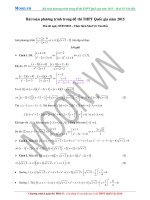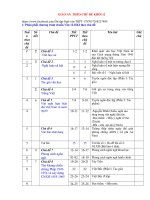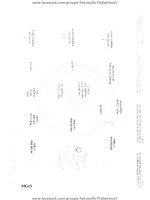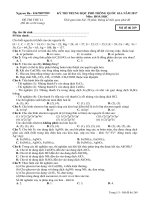CHUYEN DE THPT QG
Bạn đang xem bản rút gọn của tài liệu. Xem và tải ngay bản đầy đủ của tài liệu tại đây (142.93 KB, 7 trang )
<span class='text_page_counter'>(1)</span>BÀI 2. WRITING A PARAGRAPH, AN ESSAY VIẾT ĐOẠN VĂN, BÀI VĂN Trong kì thi THPT Quốc gia đây có lẽ là phần yếu nhất và phần có rất ít thí sinh có điểm. Trên thực tế không quá khó để có điểm, thậm chí đạt điểm cao hoặc điểm tuyệt đối cho phần này nếu học sinh nắm chắc kĩ năng tổ chúc ý tưởng, vận dụng kiến thức, thực hiện tốt các bước xây dựng dàn ý và viết bài. Trong kì thi THPT Quốc Gia năm 2015, học sinh được yêu cầu viết một đoạn văn không dưới 140 từ về một chủ đề quen thuộc đã được đề cập trong chương trình Tiếng Anh cấp THPT đặc biệt chương trình lớp 12. Bài này trình bày các thủ thuật viết đoạn văn và giới thiệu một số đề luyện tập, bài viết mẫu để các em tham khảo. Và cũng để đề phòng yêu cầu mới, những đòi hỏi cao hơn về phần viết luận trong đề thi THPT Quốc Gia những năm kế tiếp, phần viết bài luận và các bài viết mẫu cũng được giới thiệu ở phần cuối của bài này. I. What is a paragraph? Thế nào là một đoạn văn? 1. Definitions: Định nghĩa - Một đoạn văn là một loạt câu phát triển, ủng hộ, chứng minh một ý nào đó, và ý này thường là câu chủ đề (topic sentence) của đoạn văn. Các câu còn lại (supporting sentences) phát triển, giải thích, minh họa cho câu chủ đề. Câu kết luận (concluding sentence) của đoạn văn là câu khẳng định lại câu chủ điểm, tóm tắt lại các ý chính của đoạn văn. - A paragraph is a group of sentences that deal with a single topic with the length (as required in the GCSE) of around 150 words. Đoạn văn trong tiếng Anh là một tổ hợp câu với độ dài (yêu cầu thi THPT Quốc Gia) chừng 150 từ, diễn tả hay bàn thảo về một chủ đề nhất định. - Normally (but not always), the first sentence introduces the topic. Other sentences give the definitions, examples, information, reasons, restatements, and summaries. Thông thường (không phải là luôn luôn), câu đầu tiên diễn tả chủ đề. Các câu còn lại là sự giải trình, dẫn chững, tái khảng định, thêm thông tin và tóm lược. - The parts of the paragraph are linked together by the phrases and conjunctions. They guide the readers through the argument presented. Xuyên suốt đoạn văn, các cụm từ, liên từ được sử dụng để kết nối và dẫn dắt độc giả theo chủ đề được bàn thảo. 2. Parts of a Paragraph: Các phần của đoạn văn 2.1. Topic Sentence: Câu chủ đề - đưa ra chủ đề để bàn thảo 2.2. Supporting Details: Các câu văn bổ trợ cho câu chủ đề - là sự giải trình, dẫn chững, tái khảng định, hay thêm thông cho câu chủ đề, hay chủ đề. 2.3. Closing Sentence: Câu kết – là tóm lược lại hay tái khảng định lại chủ đề. II. How to Write a Paragraph: Kĩ năng viết một đoạn văn 1. Prewriting Paragraphs: Chuẩn bị trước khi viết The prewriting stage is when you think carefully and organize your ideas for your paragraph before you begin writing. Là quá trình ta động não suy nghĩ, tìm và sắp xếp các ý tưởng cho đoạn văn sẽ được viết. quá trình này tuân theo 6 bước cơ bản sau: Six Prewriting Steps: 6 bước chuẩn bị viết một đoạn văn: Step 1. Think carefully about what you are going to write. Hãy tự hỏi các câu hỏi: What question am I going to answer in this paragraph or essay? How can I best answer this question? What is the most important part of my answer? How can I make an introductory sentence (or thesis statement) from the most important part of my answer? What facts or ideas can I use to support my introductory sentence?.
<span class='text_page_counter'>(2)</span> How can I make this paragraph or essay interesting? Do I need more facts on this topic? Where can I find more facts on this topic? Step 2. Open your notebook. Hãy trả lời cho các câu hỏi ở bước 1. Không cần phải sử dụng quá nhiều thời gian để thực hiện bước này, thay vì thế hãy liệt kê những ý tưởng quan trọng (2-3 ý chính). Step 3. Collect facts related to your paragraph or essay topic. Tìm và liệt kê các ý tưởng sẽ giúp bạn trả lời các câu hỏi và là ý cho bài viết, hãy chắc chắn rằng những điều bạn liệt kê ra trùng khớp hoàn toàn với chủ đề được yêu cầu. Step 4. Write down your own ideas. Để viết các ý chính hãy tự hỏi các câu hỏi sau: What else do I want to say about this topic? Why should people be interested in this topic? Why is this topic important? Step 5. Find the main idea of your paragraph. Hãy chọn câu chủ đề cho đoạn văn, viết câu chủ đề một cách hoàn chỉnh. Step 6. Organize your facts and ideas in a way that develops your main idea. Sắp xếp các ý, các giải trình, ví dụ, hay những ý kiến bổ trợ sao cho hợp logic, khoa học, chú ý cách dùng từ ngữ, các cụm từ, liên từ (tránh lặp lại các từ đã dùng). 2. Writing Paragraphs: Kĩ năng viết đoạn văn 2.1. Writing process: Tiến hành viết Đây là bước chuyển hóa từ các ý tưởng (đã làm ở phần chuẩn bị trên đây) thành một bài viết hoàn chỉnh (sản phẩm cuối cùng). Tuân thủ 5 bước sau: Five Writing Steps: 1. Open your notebook and word processor. 2. Write the topic sentence, supporting sentences, and closing sentence. 3. Write clear and simple sentences to express your meaning. 4. Focus on the main idea of your paragraph. 5. Use the dictionary to help you find additional words to express your ideas. 2.2. Editing Paragraphs: Sửa lỗi bài viết gồm 2 bước sau: a. Grammar and Spelling: Chữa các lỗi ngữ pháp và chính tả 1. Check your spelling. 2. Check your grammar. 3. Read your essay again. 4. Make sure each sentence has a subject. 5. See if your subjects and verbs agree with each other. 6. Check the verb tenses of each sentence. 7. Make sure that each sentence makes sense. b. Style and Organization: Chữa các lỗi về hành văn 1. Make sure your paragraph has a topic sentence. 2. Make sure your supporting sentences focus on the main idea. 3. Make sure you have a closing sentence. 4. Check that all your sentences focus on the main idea. 5. See if your paragraph is interesting. 3. Useful expressions: Những liên từ, hay các cụm từ hữu ích khi viết đoạn văn: Useful expressions Sequencing/ Listing First of all, First(ly), Initially, To begin with; Second(ly); Third(ly); Next; Then; After that (this); Following this (that); Finally; The first.
<span class='text_page_counter'>(3)</span> reason is…/ The second is…; Last but not least… Adding to what you Also, Furthermore, In addition, Additionally, have said Moreover, Besides, As well as, Similarly, not only…but also…, even beside this/ that Contrasting In contrast to this, On the contrary, In contrast, Conversely, On the other hand, While, Whereas, However, Despite/ In spite of, Although, Even though, Otherwise, Nonetheless Expressing similarity Similarly; Likewise, In the same way Showing results As a result, As a consequence, Consequently, Hence, Thus, Therefore, So Giving examples For example, For instance, In particular, Particularly, That is to say, Namely, Such as Restating In other words, That is to say, To put it simply Inferring In other words, In that case, or else, Otherwise Summarizing In summary, To sum up, To conclude, To recapitulate, In conclusion, In short, In brief, In a nutshell, Lastly, Finally III. Kinds of Paragraphs: Các loại đoạn văn cơ bản 1. Definition Paragraph: Đoạn văn để định nghĩa về một sự vật, hiện tượng. e.g. Write a paragraph giving the definition of a pest. 2. Classification Paragraph: Đoạn văn để nhóm, hay phân loại các sự vật, hiện tượng. e.g. Write a paragraph discussing two types of energy resources. 3. Description Paragraph: Đoạn văn miêu tả về một sự vật, hiện tượng. e.g. Write a paragraph to talk about your most favorite subject. 4. Compare and Contrast Paragraph: Đoạn văn đề diễn tả sự so sanh hay tương phản về các sự vật, hiện tượng. e.g. Write a paragraph comparing the weather in Vancouver and Halifax. 5. Sequence Paragraph: Đoạn văn mô tả một chuỗi, hay một tiến trình ủa sự vật, sự việc. e.g. Write a paragraph outlining how a person becomes the prime minister. 6. Choice Paragraph: Đoạn văn mô tả sự chọn lựa. e.g. Write a paragraph stating whether you would prefer to play hockey or lacrosse. 7. Explanation Paragraph: Đoạn văn để giải thích e.g. Write a paragraph explaining why so many Europeans moved to Canada during the nineteenth century. 8. Evaluation Paragraph: Đoạn văn để đánh gia về sự vật, hiện tượng. e.g. Write a paragraph evaluating whether pesticides should be used on farms. IV. Writing an essay: Viết bài luận Một bài luận là một bài viết dài hơn và thường gồm nhiều đoạn và mỗi đoạn văn thường theo cấu trúc đoạn văn trình bày trên. Tuy nhiên, cách viết đoạn mở đầu (introductory paragraph) và đoạn kết (concluding paragraph) đặc thù như sau: 1. The introductory paragraph: Đoạn văn chủ đề • The attention getter - a sentence that gets the reader interested • The main idea.
<span class='text_page_counter'>(4)</span> - the topic or thesis of the essay • The guide/ thesis statement (the last sentence of the introductory paragraph) - a list of the points that will be discussed, thus showing the organization of the composition e.g. There are many things that symbolize the Vietnamese culture. Among these is the conical leaf hat, a symbol of traditional Vietnamese girls. The hat is very special because of its physical features and its use. - Attention getter: e.g. There are many things that symbolize the Vietnamese culture. - Topic/ thesis: e.g. Among these is the conical leaf hat, a symbol of traditional Vietnamese girls. - The guide/ thesis statement: e.g. The hat is very special because of its physical features and its use. 2. Bodies: Các đoạn văn nội dung Các đoạn tiếp theo sau đoạn mở đầu sẽ phát triển tương ứng các ý được đề cập trong câu chủ đề của bài luận, và cách viết tuân thủ theo cách viết đoạn văn đã được đề cập trên. Ví dụ, đối với phần mở bài trên, phần thân bài sẽ có 2 đoạn: Paragraph 1: physical features Paragraph 2: its use 3. The concluding paragraph: Đoạn văn kết Là đoạn cuối của bài luận. Thường có 3 cách để viết đoạn kết. • A summary repeats the main points of the essay. • A prediction discusses what will happen in the future. • An evaluation compares the main points and states what is best. V. Summary: Tóm lại: Structure of the Paragraph and the Essay • Main idea (topic sentence or thesis) • Support for the main idea (a number of supporting details in a paragraph or a number of paragraphs in an essay) • Conclusion (summary of the main points of support for the main idea) The writing process for the Paragraph and the Essay • First steps understanding the assignment narrowing the topic determining the writing context formulating a main idea • Generating ideas stating the main idea brainstorming freewriting listing clustering diving • Organizing ideas Drafting Revising Editing BÀI TẬP THỰC HÀNH Exercise 1. With around 160 words, write a paragraph describing a person you admire most..
<span class='text_page_counter'>(5)</span> Your -. writing should include: Who the person is? Why you admire him or her? How he/she affects your life and work?. Exercise 2. With around 160 words, write a paragraph giving your opinions of what makes a person successful in life. Your writing should include: - What success is? - The main factors that make people success? - How you think about success? Exercise 3. With around 160 words, write a paragraph giving your opinions of the benefits of being able to use English. Your writing should include: - What the main benefits of being able to use English? - What the examples to illustrate your ideas? Exercise 4. With around 160 words, write a paragraph describing your homeland. Your writing should include: - What your homeland is like? - What the main features of your homeland are? - How you love your homeland? Exercise 4. With around 160 words, write a paragraph describing your favorite school subject. Your writing should include: - What your favorite school subject is? - Why the subject interests you? - How well you learn that subject? Exercise 5. With around 160 words, write a paragraph giving your opinions on the idea of controlling the access to electronic services. Your writing should include: - How the electronic services affect people’s life? - Why the access to electronic services should be controlled? - How people control the access to electronic services? Exercise 6. With around 160 words, write a paragraph giving your opinions about the formal school education system in Vietnam. Your writing should include: - How many stages there are? - The students’ ages, the length of each stage, the examination if there is? - The tuition fee or other requirements? Exercise 7. With around 160 words, write a paragraph giving your opinions on the benefits of working for an International Organization. Your writing should include: - How your life will be like when working for an International Organization? - Why you choose to work overseas? - How you realize your dream?.
<span class='text_page_counter'>(6)</span> Exercise 8. With around 200 words, write a letter to apply for an overseas university. Your writing should include: - How you find the information about the university? - Why you choose to apply for that university? - What your abilities are? - Begin with “Dear Sir/ Madam”, ending with “Yours faithfully,” Exercise 9. With around 200 words, write a letter to apply for a job as a local tour guide. Your writing should include: - How you find the information about the vacancy? - Why you choose to work as a tour guide? - What your abilities are? - Begin with “Dear Sir/ Madam”, ending with “Yours faithfully,” Exercise 10. The widespread use of the Internet has brought many problems. What do you think the main problems associated with the use of the web? What solutions can you suggest? Your writing must has a length of over 220 words and includes: - The problems related to free access to the internet? - The harmful effects of surfing websites too much and uncontrollably? - Your suggested own ideas. Exercise 11. Young people are much more aware of and concerned about the issues like the environment, poverty, and animal welfare than previous generations. What is your own opinion? Your writing must has a length of over 220 words and includes: - The issues and the community’s concern? - The generations’ thinking? - Your own ideas. Exercise 12. It is important for travelers and business people to understand the cultures they come into contact with, however briefly. What are the main advantages of doing so? What do you think is the main disadvantage of doing so? Your writing must has a length of over 220 words and includes: - The importance of culture to visitors and businessmen? - The advantages and disadvantages? - Your own ideas. Exercise 13. More and more city workers are deciding to live in the country and travel into work every day. The result is increased traffic congestion and damage to the environment. What measures do you think could be taken to encourage people not to travel much long distance into work? Your writing must has a length of over 220 words and includes: - The trend of living in the country and working in the city? - The advantages and disadvantages? - Your own ideas. Exercise 14. Write an essay to discuss the benefits of doing exercise. Your writing must has a length of over 220 words and includes: - The importance of doing exercises? - The benefits of having a habit of taking exercise?.
<span class='text_page_counter'>(7)</span> -. Your own ideas.. Exercise 15. Write an essay to talk about the situations and to offer the solutions to protect the wildlife from being all disappearing. Your writing must has a length of over 220 words and includes: - The importance of the biodiversity? - The rights of the wildlife and measures to take to protect the environment? - Your own ideas..
<span class='text_page_counter'>(8)</span>









